DUBAI — For years, Israeli entrepreneurs slipped in and out of the United Arab Emirates incognito, traveling on second passports or doing business through third parties.
So when more than two dozen Israeli high-tech executives turned up in Dubai recently, it was hard to miss them. Chatting away in Hebrew, they traipsed across the marbled expanses of the Dubai Mall and up to the V.I.P. observation deck atop the iconic Burj Khalifa, the world’s tallest building.
It had been less than six weeks since the Emirates and Bahrain, another Gulf Arab country, signed agreements to normalize relations with Israel and open up embassies. But this high-profile delegation of Israeli innovators was making a conspicuous entrance even before direct flights and other formal protocols had been established.
Their visit was an early outgrowth of a courtship between two sides that have been adversaries — at least publicly — for decades. But the speed with which the once-covert relationship burst into the open surprised even veteran insiders: The rancor of more than seven decades of Arab-Israeli conflict seemed to melt away in a matter of days.
When the Israeli executives delivered their pitches to major investors from Abu Dhabi, the Emirati capital, in a plush hotel ballroom late last month, the two sides clicked. The Emiratis sat attentively at round tables in gleaming white robes and headdresses, listening to presentations about cybersecurity and artificial intelligence and mingling during breaks.
To the amazement of the Israelis, the Emiratis seemed most interested in a presentation by Taly Nechushtan, the chief executive of Innovopro, a food tech company that extracts a plant-based protein from chickpeas.
“Who’d have thought?” Ms. Nechushtan said afterward, amused to have caused such a stir with a regional staple that is the main ingredient of hummus. But the Israelis had arrived at a moment when the coronavirus pandemic had disrupted trade and exposed one vulnerability of the United Arab Emirates: It imports up to 90 percent of its food.
“I think we were all hungry,” quipped Abubaker Seddiq Al Khoori, the chief executive of investment house Abu Dhabi Capital Group, adding that the vegan food sector fit well with his group’s investment strategy.
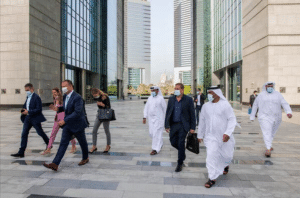
The Emirati investors also showed keen interest in a sensor presented by Yehonatan Ben Hamozeg, the founder of Agrint, an agriculture intelligence company. The sensor “listens” to palm trees and allows early detection of weevils that can eventually destroy the trees from the inside.
The United Arab Emirates has more than 40 million date palms, about a third of the world’s total. In a promising sign of future cooperation, a potential client invited Mr. Ben Hamozeg, whose sensor has been under testing for a year in the Emirates through an American subsidiary, to visit his private farm.
Another of the Emirati investors, Mohamed Mandeel, the chief operating officer of Abu Dhabi’s Royal Strategic Partners group, said he felt a sense of kinship with the Israelis. He recounted how he had taken a DNA test and found a match for his rare Babylonian gene in Tel Aviv.
“If we set aside the religious ideologies and 70 years fueled by conflict, wars and the media, we end up with human beings,” he said in an interview. “We share the same food, the same DNA, the same look,” he added, describing the Israelis as “cousins.”
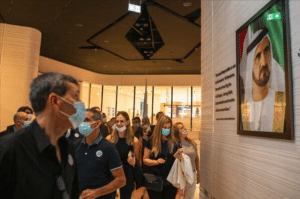
ruler.

Dazzled by the skyscrapers of Dubai rising up, Las Vegas-like, from the desert and warmed by the friendly embrace, the Israelis said the encounter felt like a dream come true, unlike any they had experienced in the Arab world before.
Erel Margalit, the Israeli venture capitalist and former lawmaker who led the delegation, was invited to the studios of the government-owned Dubai TV to appear as a guest on “Message for Peace,” a program aired in Arabic and English, and anchored by Youssef Abdulbari, a popular presenter. It was filmed against a panoramic backdrop of the Dubai and Tel Aviv skylines.
Mr. Abdulbari said off-camera that it was the first time they had hosted an Israeli.
“You can say it’s like falling in love,” Mr. Abdulbari said, describing the buzz in the studios and the intriguing sense of novelty.
Speaking on television in visionary terms, Mr. Margalit said that after London, Paris and New York, the place Israeli entrepreneurs most longed to reach was their own region.
“We are hoping to be able to do together something that is grand,” he added.
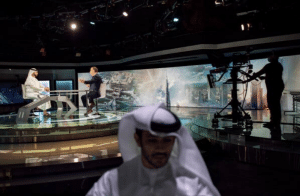
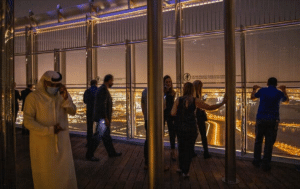
Mr. Margalit, the founder and chairman of J.V.P., a Jerusalem-based venture capital fund, had chartered a private plane from Tel Aviv to Dubai and filled it with businesspeople and reporters for the four-day visit.
His entourage included executives from 13 of the fund’s hottest portfolio companies, most of whom were visiting Dubai for the first time. Some were veterans of elite intelligence and technological units in the Israeli military.
On the flight over, he described the Emirates as a potential gateway to vast new markets with billions of people. Beyond the potential for investment of Emirati oil riches in Israeli companies, he envisaged a deeper partnership of Israel’s cutting-edge technology with the Emiratis’ knowledge and reach based on a long history of doing business from the Middle East to Africa and South Asia.
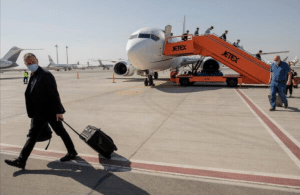
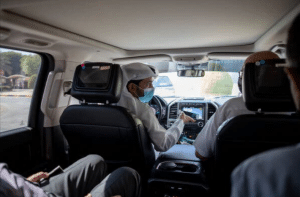
Once they arrived, it quickly became apparent that the Israeli delegation and the Emiratis were well-matched in terms of ambition and enterprise.
A welcome letter slipped under the hotel room doors of the Israeli guests bore the Hebrew greeting “Shalom aleichem.” Signed by the local chairman of the hotel’s ownership, it also invited them to be in touch to explore business opportunities together.
In contrast to Israel’s decades-old “cold peace” with Egypt and Jordan, this relationship felt different. With those countries, few business connections have been made, and the Israeli tourists who do venture over are wary of speaking Hebrew in public.
One big difference is that the Israelis and Emiratis never fought a war, so the relationship comes without the emotional baggage of defeat and bloodshed.
The under-the-radar ties grew over decades out of a burgeoning alliance of Israel and the Gulf Arab states against their common enemy, Iran. Much has been done since the normalization deals were inked, in the final weeks leading up to the U.S. election as President Trump amped up pressure to notch a few final foreign policy achievements.
Israeli and Emirati officials have already exchanged visits and signed agreements for the protection of investments, civil aviation and reciprocal visa exemptions to support business and tourism.
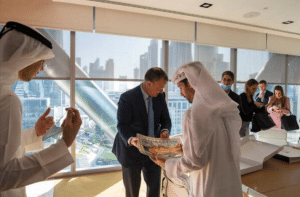
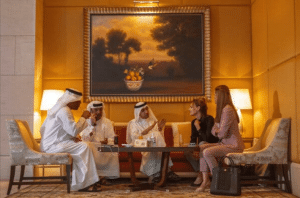
David Meidan, a former senior official of the Mossad, the Israeli intelligence agency, first visited the Emirates with his boss in 2005. He has since turned to doing business there, and joined the J.V.P. delegation. Mr. Margalit credited him with helping to pave the way for the newcomers.
“For me, this is closing a circle,” Mr. Meidan said.
J.V.P. delegates also met with government ministers, although the only such gathering to be publicized was with the minister of state for food security.
Some of the Israeli executives were whisked off for discreet meetings with sheikhs over late-night lamb dinners, on boats to island mansions or in jeeps on desert romps. But there were no instant deals to be made: The Emiratis are known to be cautious in business, and one Israeli company had already been under review there for 18 months.
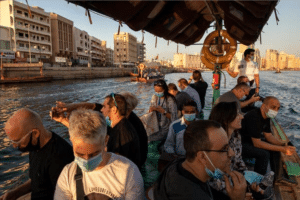

The Emiratis also took security precautions, with young plainclothes officers discreetly following the Israelis throughout the visit. The security-minded Israelis remarked about how safe they felt, even when walking alone in the alleys of Dubai’s gold and spice
markets emptied of tourists by the pandemic.
Merchants from Afghanistan and elsewhere greeted the visitors with enthusiasm after inquiring about where they were from.
“Come, we need you!” urged one trinket seller, volunteering that he was from Iran, just across the waters of the Gulf.
The symbolism was not lost on Dror Liwer, a senior Israeli executive at Coronet, a company that offers cyberdefense based on artificial intelligence. His father, he said, had traded in arms with Iran before the Islamic Revolution of 1979.
“Now I’m here because my enemy’s enemy is a friend,” he said.
